
The Republic of Uzbekistan is a presidential constitutional republic, whereby the President of Uzbekistan is head of state. Executive power is exercised by the government and by the Prime Minister of Uzbekistan.

The Politics of Azerbaijan take place in an authoritarian system where elections are not free and fair, political opponents are repressed, civil rights are limited, human rights abuses are widespread, corruption is rampant, and power is concentrated in the hands of President Ilham Aliyev and his extended family.

Maumoon Abdul Gayoom is an Islamic Scholar and a Maldivian politician who served as President of the Maldives from 1978 to 2008. After serving as transport minister, he was nominated president by the People's Majlis and succeeded Ibrahim Nasir in 1978. He was defeated in 2008 during the first Presidential Elections after democratic reforms in the Maldives. He holds the nations highest award, "The Most Honourable Order of Distinguished Rule of Ghaazee", presented to him in 2013. Maumoon was the longest-serving president in Asia.

The Prime Minister of Pakistan is the head of government of the Islamic Republic of Pakistan. Executive authority is vested in the prime minister and his chosen cabinet, despite the president of Pakistan serving as the nominal head of executive. The prime minister is often the leader of the party or the coalition with a majority in the lower house of the Parliament of Pakistan, the National Assembly where he serves as Leader of the House. Prime minister holds office by virtue of their ability to command the confidence of the National Assembly. The prime minister is designated as the "Chief Executive of the Islamic Republic".

The National Assembly of Pakistan is the lower house of the bicameral Parliament of Pakistan, with the upper house being the Senate. As of 2023, the National Assembly has a maximum membership of 336, of which 266 are directly elected by an adult universal suffrage and a first-past-the-post system to represent their respective constituencies, while 70 are elected on reserved seats for women and religious minorities from all over the country. Members hold their seats for five years or until the house is dissolved by the President on the advice of the Prime Minister. The house convenes at the Parliament House, Red Zone, Islamabad.

The Parliament of Pakistan is the supreme legislative body of the Islamic Republic of Pakistan. It is a bicameral federal legislature, composed of the President of Pakistan and two houses: the Senate and the National Assembly. The president, as head of the legislature, has the power to summon or prorogue either house of the Parliament. The president can dissolve the National Assembly, only on the Prime Minister's advice.

The prime minister of Iran was a political post that had existed in Iran (Persia) during much of the 20th century. It began in 1906 during the Qajar dynasty and into the start of the Pahlavi dynasty in 1923 and into the 1979 Iranian Revolution before being abolished in 1989.

The Council of Representatives, usually referred to simply as the Parliament, is the unicameral legislature of the Republic of Iraq. According to the Constitution of Iraq, it is the lower house of the bicameral legislature of the country. As of 2020, it comprises 329 seats and meets in Baghdad inside the Green Zone.
Presidential elections were held in Iran on 24 July 1981 after the previous Iranian president, Abolhassan Banisadr, was impeached by the Majlis on 21 June and then sacked by the Supreme Leader, Ayatollah Khomeini, on 22 June. The elections occurred after the Hafte Tir bombing, which killed Mohammad Beheshti and dozens of other Iranian officials on 28 June 1981. This led to the election of Mohammad Ali Rajai, the previous prime minister, winning 13,001,761 votes out of the 14,573,803 votes cast, which was 89% of the votes. The vote turnout was 65.29%.

King Muhammad Fareed Didi, , the son of the Sultan Prince Abdul Majeed Didi, was the last Sultan of Maldives and the first Maldivian monarch to assume the title of "King" with the style of "His Majesty". He was the Sultan of the Maldives from March 7, 1954, until July 26, 1965, and King of the Maldives from July 26, 1965, until November 11, 1968. He was deposed in 1968 from the throne when Maldives became a republic, and died the following year in Maldives.
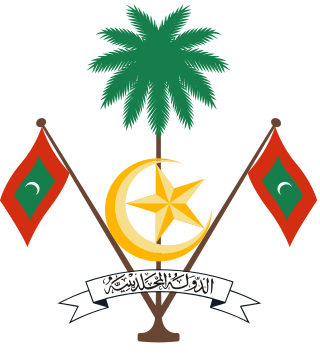
The President of the Republic of Maldives is the head of state and head of government of the Republic of Maldives and the commander-in-chief of the Maldives National Defence Force.

The People's Majlis is the unicameral legislative body of Maldives. The Majlis has the authority to enact, amend and revise laws, as outlined in the Constitution of the Maldives. The Majlis is composed of 87 members as of 2019. The number was reduced to 80 as of 18th December 2023 since some former members of the ruling PPM-PNC coalition are appointed to the government's posts. However, the government has appealed this in the Supreme Court on 30th January 2024, and on 5th February 2024, the court ruled in favor of the government, hence reverting the number to 87 members.
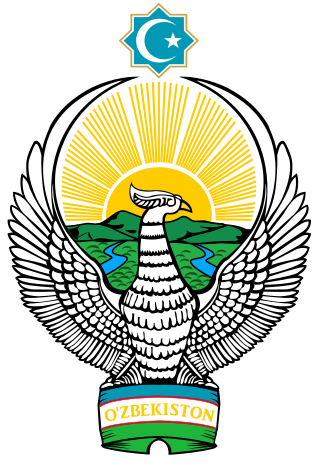
The president of the Republic of Uzbekistan is the head of state and executive authority in Uzbekistan. The office of President was established in 1991, replacing the position of Chairperson of the Presidium of the Supreme Soviet of the Uzbek SSR, which had existed since 1925. The president is directly elected for a term of seven years, by citizens of Uzbekistan who have reached 18 years of age.
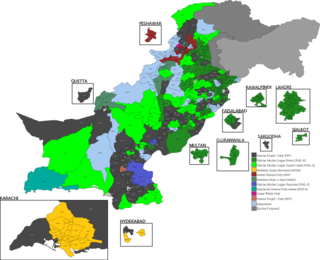
General elections were held in Pakistan on 18 February 2008 to elect members of the 13th National Assembly and the four Provincial Assemblies.
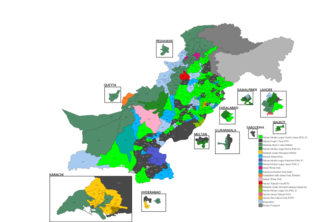
General elections were held in Pakistan on 10 October 2002 to elect the 12th National Assembly and four Provincial Assemblies. The elections were held under the military government of Pervez Musharraf. The two mainstream parties, Pakistan Peoples Party (PPP) and Pakistan Muslim League (N) (PML-N) had several restrictions imposed on them and their leaders Benazir Bhutto and Nawaz Sharif were in exile. In order to address the restrictions, PPP created the Pakistan Peoples Party Parliamentarians (PPPP) under the leadership of Ameen Faheem, to contest the elections on its behalf. The PML-N meanwhile, suffering from the party's division into two factions: one that remained loyal to Sharif and were contesting the elections under the leadership of Javed Hashmi, and the other which had broken away to form the pro-Musharraf Pakistan Muslim League (Q) (PML-Q) under the leadership of Mian Muhammad Azhar. The emergence of the PML-Q marked the beginning of multi-party politics in the country, bringing an end to the decade-long two-party system between the PPP and PML-N.

Ahmed Zaki was a Maldivian politician.

The Cabinet of Iran is a formal body composed of government officials, ministers, chosen and led by a President. Its composition must be approved by a vote in the Parliament. According to the Constitution of the Islamic Republic of Iran, the President may dismiss members of the cabinet, but must do so in writing, and new appointees must again be approved by the Parliament. The cabinet meets weekly on Saturdays in Tehran. There may be additional meetings if circumstances require it. The president chairs the meetings. The Supreme Leader has the power to dismiss cabinet members like ministers and vice presidents, as well as the President, at any time, regardless of the Parliament's decisions.
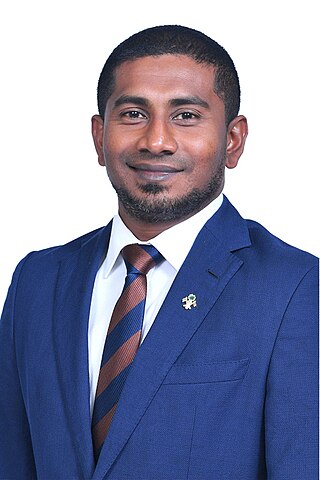
Ahmed Mahloof is a Maldivian politician who served as the Minister of Youth, Sports, and Community Empowerment. Mahloof is former footballer and manager of the Maldives national football team. He is now a politician who has served as MP for Galolhu-South constituency in the People's Majlis.

Prime Minister of the Maldives was a public office in the Sultanate of the Maldives and the Republic of the Maldives. The last Prime Minister was Ahmed Zaki, during the presidency of Maumoon Abdul Gayoom. On 6 March 1975, Zaki was removed from office and the position was abolished.
Parliamentary elections were held in the Maldives in September 1969, the first under the 1968 constitution. The newly elected People's Majlis convened in February 1970.

















